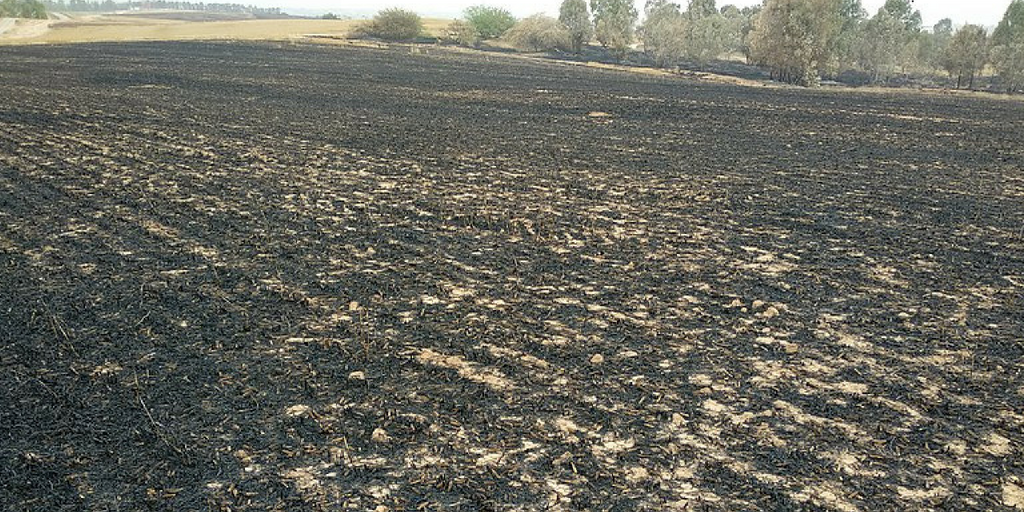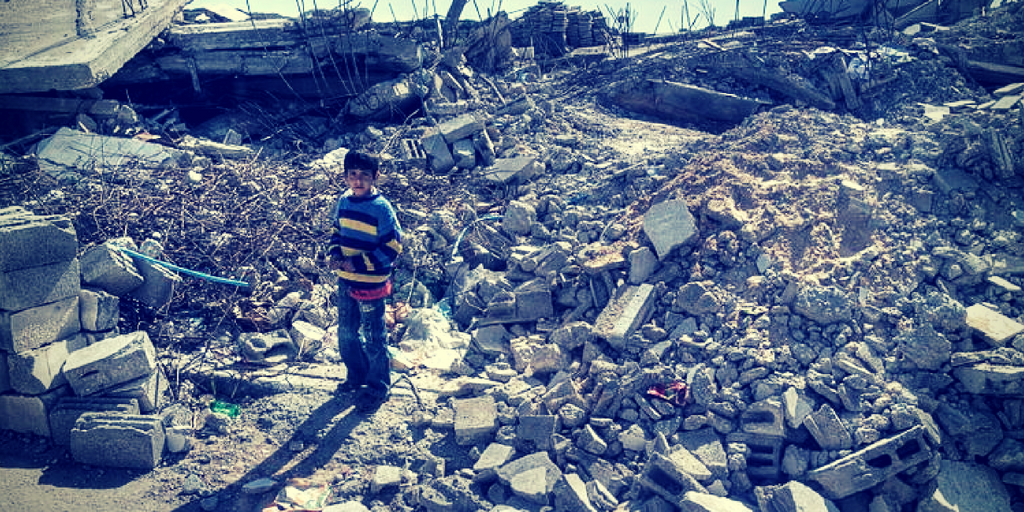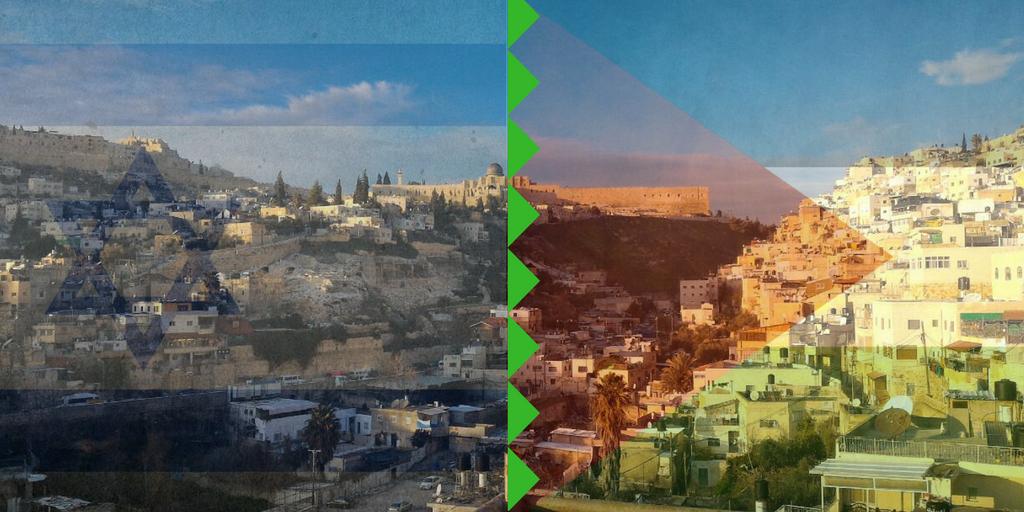Originally Posted in Abu Yehuda.
Great swaths of land in the Negev desert near the Gaza strip, agricultural land and nature preserves formerly the habitats of numerous endangered plant and animal species, have been reduced to ash and smoke by Palestinian fire-kites and balloon-borne incendiary devices during the past few weeks. The entire area is blackened with the smoke from fires that are being set faster than Israeli firefighters can put them out.
Our powerful army dithers, ever pursuing its apparent goal of fighting wars without hurting anyone. Today I understand that a car belonging to one of the leaders of the bombing campaign was destroyed by an “airstrike,” probably a drone-launched missile. The car was parked and empty. That’ll teach him.
Israeli officials are afraid of the legal consequences of taking effective action against those who are launching the kites and balloons. They are afraid that they will be dragged into the International Criminal Court (even though Israel did not sign the treaty creating it and does not consider itself bound by its decisions), if the army kills any of the “civilians” that are burning our country. Those under the age of 18 are counted as “children,” and as you know one of the themes of anti-IDF propaganda is the false claim that we deliberately target children.
Purposely burning agricultural land is a war crime. Attacking from heavily populated civilian areas and employing child soldiers are war crimes. Hamas and PIJ (Palestinian Islamic Jihad) don’t care, of course. Their whole strategic plan is to take advantage of the fact that Israel considers herself bound by the laws of war, the Geneva Conventions and other treaties, while they permit themselves to do anything that will kill Jews.
They don’t do it by themselves. They have help.
Israel is always required to fight an n+1 front war, with n representing the enemies that are shooting at us, Hamas, PIJ, Hezbollah, and the rest. The additional one is the international diplomatic and legal system, led by our “friends” in the European Union.
In the past week, two Israeli communities in Judea and Samaria have been partly demolished, because homes have been found to be built on “private Palestinian land.” This means that – regardless of whether the land was considered state land when the homes were built – a Palestinian claim, sometimes not even by an individual owner, that the land was at one time used for agricultural purposes by Palestinians, has been accepted by Israel’s Supreme Court. The remedy is invariably that any structure that encroaches on such land will be demolished in toto.
Recently, the Knesset passed a law (the “Regulation Law”) that allows the state to financially compensate the Palestinian “owners” when the land was not considered private at the time the structures were built, instead of bulldozing the buildings (this can be tricky, since there usually are no records that might prove ownership in the sense familiar to those living in normal countries). This law didn’t apply in these cases, because the Supreme Court had ordered the demolitions some months ago, before the law was passed. The Court has now frozen the law awaiting its decision on various petitions against it.
Naturally, our European friends and home-grown champions of Palestinian rights were scandalized by this law. “It’s legalized land theft,” they say. This is quite an exaggeration, since the law calls for the Palestinians to be paid above-market value for the land, which they are not using and may not have used for decades (if ever). Eminent domain proceedings in the US, in which an owner can be evicted from property where he is living or using for business, are far harsher. But my guess is that despite this, when the Supreme Court rules on the petitions filed against it, they will overthrow the law.
Now you may wonder who files these petitions, the ones against the Regulation Law and the ones claiming that Israeli structures have been built on “private Palestinian land.” The answer is that there is a whole industry in Israel of “human rights” non-governmental organizations that employs a battery of expensive and dedicated lawyers to fight the State of Israel. Thanks to Israel’s extraordinary system in which any citizen may petition the Supreme Court on almost any matter, regardless of whether he or she is affected by it, left-wing groups like Peace Now, Yesh Din, and others can and do involve themselves in these matters.
But who supports the organizations, pays their staffs and their lawyers? Probably no more than a few percent of Israelis support what most see as their extremist ideology. And yet left-wing NGOs are everywhere, filming and trying to provoke IDF soldiers doing their duty, finding Palestinians who will testify that their grandfathers worked the land on such-and-such a hill where today an Israeli settlement stands, and filing petition after petition in the Israeli courts, particularly the Supreme Court.
The money does not come from Israel. It doesn’t even come from the Palestinians, whose leaders are happy to skim millions from the aid they get from the US and Europe, primarily to live well or put into their Swiss bank accounts. It comes, unsurprisingly, mostly from European governments, where millions of Euros are funneled into organizations like Peace Now, Yesh Din, B’tselem, Physicians for Human Rights – Israel, Breaking the Silence, Adalah, and many others. Somewhat less important donors include the American New Israel Fund and Rockefeller Brothers Fund.
These foreign-funded NGOs are active in the Israeli and international legal arenas, as well as the international propaganda campaign to demonize and delegitimize the State of Israel. Some explicitly support BDS, despite the official positions of their donors. For example, several of them recently sent a letter to the American Secretary of State calling for an arms embargo against Israel because of its actions to defend its border.
Today the NGO Monitor organization, which keeps track of anti-Israel NGOs and their funding, released a report showing that the European Union has given large grants (hundreds of thousands of Euros) to several NGOs to press war crimes accusations against IDF officers and soldiers and other Israeli officials in foreign courts. This sort of thing may in part explain the timidity of the IDF to take effective action against the arsonists of Gaza.
While our Arab and Iranian enemies have had little success in damaging our Jewish state with wars and terrorism, our European ones have succeeded with their Euros to roll back settlement activities in Judea/Samaria, resulting in the expulsion of Jews from their homes. They have fought tooth and nail against our government’s efforts to deport illegal migrants, whom it rightly considers a demographic and social threat. They have hamstrung the IDF’s response to arson terrorism from Gaza, and turned the main concern of the IDF from defeating our enemies to avoiding legal entanglements.
The message this sends to the terrorists of Hamas, the PLO, and the PIJ is simple: you have a green light – the Jews are too weak to fight back.
There are solutions to these problems. Two years ago, the Knesset passed a relatively weak transparency law requiring some NGOs to report contributions from foreign governments. It needs to be strengthened – in fact, there is no reason for Israel to permit foreign governments to intervene in our domestic affairs at all. Opponents will tell you, precisely inverting the truth, that limiting the influence of foreign-funded NGOs is “anti-democratic,” as if democracy requires subverting the will of Israeli voters! But there is only one reason that such legislation is opposed in the Knesset, and that is because some members are themselves treasonously sucking at the European teat. That has to stop.
The Supreme Court has far too much power and zero accountability. No other democratic country has such a situation. The balance of power between the branches of government must be restored.
The other necessary change is a change of attitude. The more Israel refrains from self-defense because of fear of the legal consequences, the more she will be threatened with such consequences. The cycle must be broken, both because it prevents us from acting and because it broadcasts weakness to our enemies. The arson kites need to be met with deadly force, not endless debate. Jewish residents of the territories should have at least equal rights as Arabs, and not be evicted from their homes as a result of legal catch-22s. Illegal migrants should be deported (see here and here).
The legal and diplomatic decks are stacked against us today, partly because of our own actions. We need to get over it and defend ourselves. Nobody else will.





